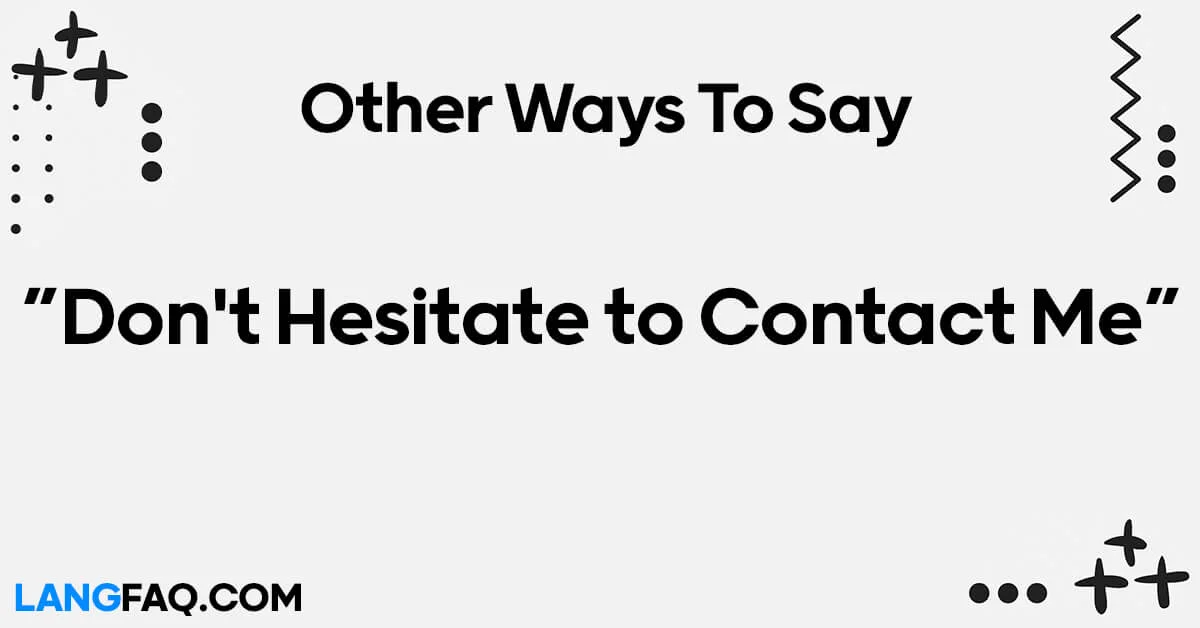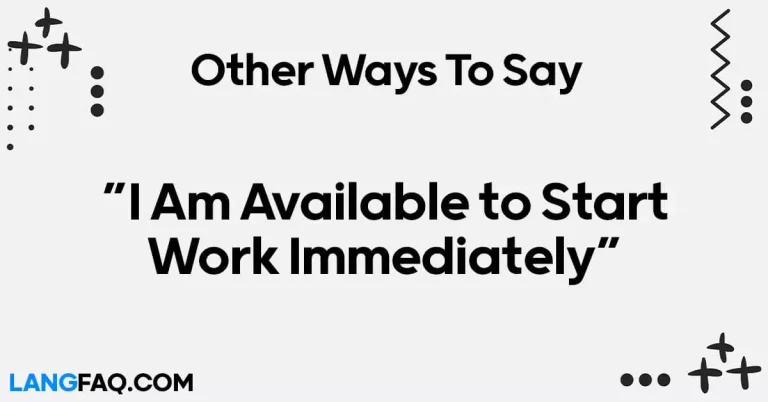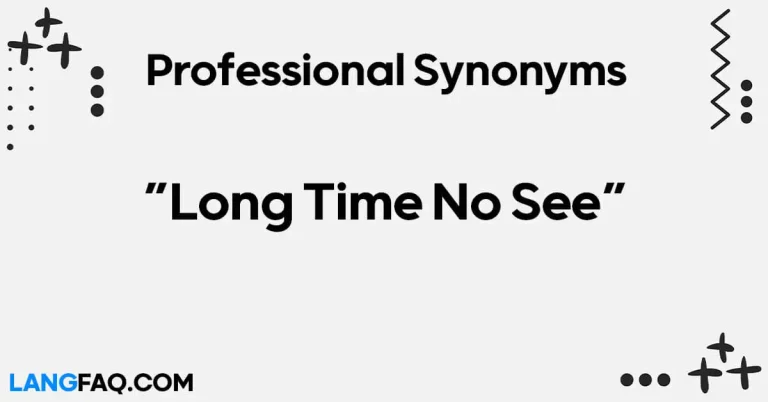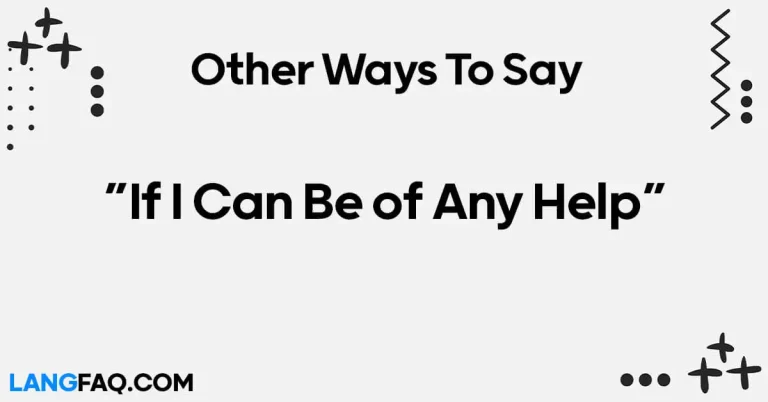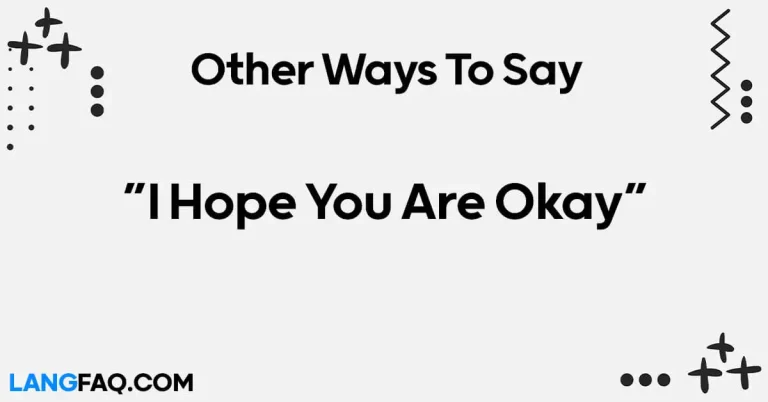In a world where connections matter, the phrase “Don’t Hesitate to Contact Me” holds immense significance. It’s more than a simple invitation; it’s an open door to communication, collaboration, and opportunity. But what does it truly mean to embrace this ethos?
12 Other Ways to Say “Don’t Hesitate to Contact Me”
Here’s a table with the meaning and examples of alternative ways to say “Don’t Hesitate to Contact Me”:
| Phrase | Meaning | Examples |
|---|---|---|
| Feel free to reach out | Encouragement to contact without hesitation | “Feel free to reach out if you have any questions.” |
| Don’t hesitate to get in touch | Prompt to initiate contact | “Don’t hesitate to get in touch if you need assistance.” |
| I’m here for you whenever you need assistance | Availability to help whenever needed | “I’m here for you whenever you need assistance with anything.” |
| Let me know if there’s anything I can help with | Offer of assistance | “Let me know if there’s anything I can help with.” |
| Feel welcome to drop me a line anytime | Invitation to contact anytime | “Feel welcome to drop me a line anytime you have a question.” |
| Don’t be shy about contacting me | Encouragement to overcome hesitation | “Don’t be shy about contacting me if you need support.” |
| Reach out whenever you have questions or concerns | Invitation to communicate | “Feel free to reach out whenever you have questions or concerns.” |
| Please don’t hesitate to reach out if you need assistance | Encouragement to seek help | “Please don’t hesitate to reach out if you need assistance with anything.” |
| I’m just a message away if you need anything | Availability for assistance | “I’m just a message away if you need anything at all.” |
| Feel comfortable contacting me whenever necessary | Encouragement to initiate contact | “Feel comfortable contacting me whenever necessary.” |
| Please feel encouraged to contact me whenever you need support | Invitation to seek assistance | “Please feel encouraged to contact me whenever you need support.” |
| Don’t think twice about reaching out if you require assistance | Encouragement to seek help | “Don’t think twice about reaching out if you require assistance.” |
These alternative phrases provide various ways to express openness and willingness to communicate. By using these inviting and encouraging expressions, you can foster better connections and make it easier for others to reach out when needed.
Is It Correct to Say “Don’t Hesitate to Contact Me”?
Yes, “Don’t hesitate to contact me” is a correct and commonly used phrase in English. It conveys an open invitation for someone to reach out without any reluctance or hesitation. This phrase is often used in both formal and informal contexts to encourage communication and express willingness to assist or engage with others.
Professional Mail Example With “Don’t Hesitate to Contact Me”
Subject: Project Collaboration Opportunity
Dear [Recipient’s Name],
I hope this email finds you well. I am writing to discuss a potential collaboration opportunity that I believe aligns with your expertise and interests.
Our team is currently working on a project aimed at [brief description of the project]. Given your extensive experience in [relevant field or area], I believe your insights and contributions would greatly benefit our efforts.
I understand that you may have questions or require further clarification regarding the project details or your potential involvement. Please don’t hesitate to contact me if you would like to discuss this opportunity further or if you have any inquiries. I am more than happy to provide additional information and address any concerns you may have.
I look forward to the possibility of working together and exploring how we can mutually contribute to the success of this project.
Thank you for considering this opportunity, and I hope to hear from you soon.
Best regards,
[Your Name] [Your Position] [Your Contact Information]
Feel Free to Reach Out
Encouraging others to initiate contact can foster open communication and build stronger relationships. Whether in a professional or personal context, inviting people to reach out without hesitation can create a welcoming atmosphere.
Meaning and Usage
“Feel free to reach out” is a friendly and informal way to invite others to initiate contact. It conveys openness and availability, reassuring individuals that they are welcome to get in touch at any time.
Examples
Professional Context:
- Scenario: You’re a manager leading a team project. You want your team members to feel comfortable reaching out to you with any questions or concerns.
- Example Sentence: “Feel free to reach out if you need clarification on any aspect of the project.”
Personal Context:
- Scenario: You’re catching up with a friend who’s been going through a tough time. You want to offer your support and let them know you’re there for them.
- Example Sentence: “Feel free to reach out if you ever need someone to talk to. I’m here for you.”
Email Sample
Subject: Reaching Out
Hi [Recipient’s Name],
I hope this email finds you well. I just wanted to let you know that if you have any questions or need assistance with [project/task], feel free to reach out to me anytime. I’m here to help in any way I can.
Looking forward to hearing from you.
Best regards, [Your Name]
Variations
- Colleagues: “Feel free to contact me if you have any questions about the project.”
- Friends: “Feel free to give me a call if you want to hang out.”
- Mentor-Mentee: “Feel free to reach out if you need guidance on your career path.”
Pros and Cons
Pros:
- Creates a welcoming atmosphere
- Encourages open communication
- Demonstrates availability and willingness to help
Cons:
- May be considered informal in certain professional settings
- Might be perceived as overly casual in some contexts
Related Insights
According to Cambridge Dictionary, the phrase “feel free to do something” means to do something if you want to, without being worried about what other people might think or say.
Tips
- Use “feel free to reach out” at the end of an email or conversation to invite further communication.
- Pair this phrase with a specific offer of assistance to make it more meaningful and actionable.
Don’t Hesitate to Get in Touch
Prompting others to initiate contact by reassuring them not to hesitate can alleviate any reservations they may have about reaching out. It emphasizes the importance of communication and signals openness to engagement.
Meaning and Usage
“Don’t hesitate to get in touch” is a straightforward and assertive way to encourage others to reach out. It communicates a sense of urgency and importance, emphasizing the need for prompt communication.
Examples
Professional Context:
- Scenario: You’re collaborating on a project with a colleague from another department. You want to ensure seamless communication throughout the process.
- Example Sentence: “If you have any questions or concerns, don’t hesitate to get in touch with me.”
Personal Context:
- Scenario: You’re organizing a surprise party for a friend and need help coordinating the details. You want to let other friends know they can contribute ideas or assistance.
- Example Sentence: “Don’t hesitate to get in touch if you have any creative ideas or suggestions for the party.”
Email Sample
Subject: Reaching Out
Hello [Recipient’s Name],
I wanted to touch base regarding [topic/project]. If you have any questions or need further clarification, don’t hesitate to get in touch with me. Your input is valuable, and I’m here to assist in any way I can.
Looking forward to hearing from you soon.
Warm regards, [Your Name]
Variations
- Colleagues: “Don’t hesitate to contact me if you need help with your part of the project.”
- Friends: “Don’t hesitate to give me a call if you want to catch up.”
- Mentor-Mentee: “Don’t hesitate to reach out if you need advice on your career decisions.”
Pros and Cons
Pros:
- Encourages proactive communication
- Conveys urgency and importance
- Signals availability and willingness to assist
Cons:
- May come across as slightly formal in casual contexts
- Could be perceived as directive or commanding in certain situations
Related Insights
According to Merriam-Webster Dictionary, the word “hesitate” means to hold back in doubt or indecision.
Tips
- Use “don’t hesitate to get in touch” when you want to convey a sense of urgency or importance in your communication.
- Pair this phrase with specific instructions or requests to prompt action from the recipient.
I’m Here for You Whenever You Need Assistance
Expressing availability and willingness to help can reassure others that support is readily available whenever they need it. This phrase conveys reliability and reliability, fostering trust and confidence in the relationship.
Meaning and Usage
“I’m here for you whenever you need assistance” emphasizes the speaker’s readiness to provide support whenever it’s needed. It communicates a sense of reliability and dependability, reassuring the listener that help is just a request away.
Examples
Professional Context:
- Scenario: You’re a team leader overseeing a project. You want your team members to know they can rely on you for guidance and support throughout the project.
- Example Sentence: “As your team leader, I want you to know that I’m here for you whenever you need assistance. Don’t hesitate to reach out if you encounter any challenges.”
Personal Context:
- Scenario: Your friend is going through a difficult time and needs emotional support. You want to reassure them that you’re available to listen and offer assistance whenever they need it.
- Example Sentence: “I know you’re going through a tough time, but remember, I’m here for you whenever you need assistance. Don’t hesitate to reach out, even if it’s just to talk.”
Email Sample
Subject: Here to Help
Hi [Recipient’s Name],
I wanted to reach out and remind you that I’m here for you whenever you need assistance. Whether it’s regarding [topic/project] or anything else, feel free to reach out to me. I’m ready to lend a hand whenever you need it.
Take care, [Your Name]
Variations
- Colleagues: “I’m here to support you with any work-related challenges you may encounter.”
- Friends: “Just wanted to remind you that I’m here for you, no matter what.”
- Mentor-Mentee: “You can count on me for guidance and assistance throughout your journey.”
Pros and Cons
Pros:
- Instills a sense of trust and reliability
- Conveys genuine availability and willingness to help
- Reassures others that support is readily available
Cons:
- May be perceived as slightly formal in casual contexts
- Could potentially be overused, diminishing its impact over time
Related Insights
According to Oxford Dictionary, the word “assistance” refers to the action of helping someone with a task or problem.
Tips
- Use “I’m here for you whenever you need assistance” when you want to reassure someone of your availability and willingness to help.
- Follow up with specific offers of assistance or support to make your offer more meaningful and actionable.
Let Me Know if There’s Anything I Can Help With
Offering assistance in a proactive manner shows empathy and willingness to support others. By extending a helping hand and expressing openness to assist, you create a supportive environment where people feel comfortable seeking help when needed.
Meaning and Usage
“Let me know if there’s anything I can help with” is a polite and considerate way to offer assistance. It communicates a willingness to help without imposing or assuming what the other person may need.
Examples
Professional Context:
- Scenario: You’re working on a team project, and a colleague seems overwhelmed with their tasks. You want to offer your assistance without being intrusive.
- Example Sentence: “Hey [Colleague’s Name], I noticed you’ve been juggling a lot of tasks lately. Let me know if there’s anything I can help with to lighten the load.”
Personal Context:
- Scenario: Your friend is moving to a new apartment, and you want to offer your support during the transition.
- Example Sentence: “Hey [Friend’s Name], I heard you’re moving next week. Let me know if there’s anything I can help with, like packing boxes or lifting heavy furniture.”
Email Sample
Subject: Here to Assist
Hi [Recipient’s Name],
I hope you’re doing well. I wanted to check in and see if there’s anything I can assist you with. Whether it’s work-related or personal, feel free to reach out and let me know how I can help.
Best regards, [Your Name]
Variations
- Colleagues: “If there’s anything I can do to support you with the project, please don’t hesitate to let me know.”
- Friends: “Just wanted to remind you that I’m here for you. Let me know if there’s anything I can do to help.”
- Mentor-Mentee: “As your mentor, my role is to support you in your professional development. Let me know if there’s anything specific you need assistance with.”
Pros and Cons
Pros:
- Demonstrates empathy and willingness to support
- Offers assistance without imposing on the other person
- Creates a supportive and collaborative environment
Cons:
- May be perceived as generic if not accompanied by specific offers of assistance
- Could potentially lead to requests for help that you may not be able to fulfill
Related Insights
According to Merriam-Webster Dictionary, the word “assist” means to give support or aid to someone in a task or undertaking.
Tips
- Be genuine in your offer to help and follow through with any assistance you offer.
- Be specific in your offer of assistance to make it easier for the other person to accept your help.
Feel Welcome to Drop Me a Line Anytime
Inviting others to initiate contact at their convenience shows accessibility and openness to communication. By encouraging individuals to reach out whenever they feel comfortable, you create a relaxed and inviting atmosphere for interaction.
Meaning and Usage
“Feel welcome to drop me a line anytime” is a casual and friendly invitation to initiate contact. It conveys openness and availability while allowing the other person to reach out at their convenience.
Examples
Professional Context:
- Scenario: You’re collaborating with a colleague on a project, and you want to maintain open lines of communication throughout the process.
- Example Sentence: “Hey [Colleague’s Name], feel welcome to drop me a line anytime if you have questions or need clarification on anything.”
Personal Context:
- Scenario: You’re catching up with a friend who lives in a different time zone, and you want to let them know they can reach out whenever it’s convenient for them.
- Example Sentence: “Hey [Friend’s Name], I know we’re in different time zones, but feel welcome to drop me a line anytime. I’m always here to chat, no matter the time.”
Email Sample
Subject: Keeping in Touch
Hi [Recipient’s Name],
I wanted to touch base and remind you that you’re welcome to drop me a line anytime. Whether it’s about [topic/project] or just to say hello, feel free to reach out whenever it’s convenient for you.
Take care, [Your Name]
Variations
- Colleagues: “Feel free to send me an email anytime if you have questions or need assistance with the project.”
- Friends: “Just wanted to remind you that my inbox is always open. Drop me a line anytime you want to catch up.”
- Mentor-Mentee: “As your mentor, I’m here to support you in your journey. Feel welcome to reach out anytime if you need guidance or advice.”
Pros and Cons
Pros:
- Creates a relaxed and inviting atmosphere for communication
- Allows the other person to initiate contact at their convenience
- Demonstrates accessibility and availability
Cons:
- May be perceived as slightly informal in certain professional settings
- Could potentially lead to sporadic or unexpected communication if not managed effectively
Related Insights
According to Collins Dictionary, the phrase “drop someone a line” means to write someone a brief letter or message.
Tips
- Use “feel welcome to drop me a line anytime” to maintain open lines of communication without imposing on the other person’s schedule.
- Set expectations for response times to manage communication effectively and avoid misunderstandings.
Don’t Be Shy About Contacting Me
Encouraging others to overcome hesitations or reservations about initiating contact can foster open communication and build stronger relationships. By reassuring individuals that it’s okay to reach out, you create a supportive environment where people feel comfortable seeking assistance or guidance.
Meaning and Usage
“Don’t be shy about contacting me” is a friendly and reassuring invitation to initiate contact without hesitation. It conveys encouragement and support, letting the other person know that their communication is welcome and valued.
Examples
Professional Context:
- Scenario: You’re leading a team on a project, and you notice a team member hesitating to ask for help. You want to reassure them that it’s okay to reach out whenever they need assistance.
- Example Sentence: “Hey [Team Member’s Name], don’t be shy about contacting me if you have any questions or need support. I’m here to help.”
Personal Context:
- Scenario: Your friend is interested in attending a social event but feels hesitant to ask for details. You want to encourage them to reach out and express their interest.
- Example Sentence: “Hey [Friend’s Name], don’t be shy about contacting me if you want more information about the event. I’d love to fill you in on the details.”
Email Sample
Subject: Here to Assist
Hi [Recipient’s Name],
I wanted to reach out and remind you that you shouldn’t be shy about contacting me. Whether it’s about [topic/project] or anything else, feel free to reach out anytime. I’m here to assist in any way I can.
Best regards, [Your Name]
Variations
- Colleagues: “Don’t hesitate to contact me if you need assistance with your part of the project. I’m here to support you.”
- Friends: “Just a reminder that you shouldn’t be shy about reaching out if you want to catch up. I’m always here to chat.”
- Mentor-Mentee: “As your mentor, I encourage you not to be shy about contacting me if you need guidance or advice. I’m here to help you succeed.”
Pros and Cons
Pros:
- Provides reassurance and support to individuals who may feel hesitant to initiate contact
- Encourages open communication and collaboration
- Builds trust and rapport in relationships
Cons:
- May not be effective if the recipient’s hesitation stems from deeper issues such as lack of confidence or trust
- Could potentially be perceived as patronizing if not communicated with sincerity and empathy
Related Insights
According to Cambridge Dictionary, the phrase “don’t be shy” means to not hesitate or be afraid to do something.
Tips
- Use “don’t be shy about contacting me” to reassure others that their communication is welcome and valued.
- Offer specific examples or scenarios where the other person may need assistance to make your encouragement more relatable and actionable.
Reach Out Whenever You Have Questions or Concerns
Encouraging others to reach out whenever they have questions or concerns promotes open communication and collaboration. By inviting individuals to seek assistance or clarification as needed, you create a supportive environment where everyone feels comfortable voicing their thoughts and opinions.
Meaning and Usage
“Reach out whenever you have questions or concerns” is a proactive invitation to initiate contact for clarification or assistance. It communicates accessibility and willingness to help, fostering a culture of openness and collaboration.
Examples
Professional Context:
- Scenario: You’re leading a training session for new employees, and you want to ensure they feel comfortable asking questions throughout the session.
- Example Sentence: “During today’s training, feel free to reach out whenever you have questions or concerns. I’m here to help clarify any concepts or address any issues you may encounter.”
Personal Context:
- Scenario: You’re planning a group outing with friends, and you want everyone to feel comfortable expressing their preferences or concerns about the event.
- Example Sentence: “As we plan our outing, please feel free to reach out whenever you have questions or concerns. Your input is valuable, and I want to make sure everyone has a great time.”
Email Sample
Subject: Open Communication
Hi [Recipient’s Name],
I wanted to remind you that open communication is key, so please feel free to reach out whenever you have questions or concerns. Whether it’s about [topic/project] or anything else, I’m here to assist in any way I can.
Looking forward to hearing from you, [Your Name]
Variations
- Colleagues: “If you encounter any challenges or have questions about your tasks, please don’t hesitate to reach out. We’re here to support you.”
- Friends: “Just a reminder that my inbox is always open for you. Feel free to reach out whenever you have questions or concerns.”
- Mentor-Mentee: “As your mentor, I encourage you to reach out whenever you have questions or concerns about your career path. I’m here to provide guidance and support.”
Pros and Cons
Pros:
- Promotes open communication and collaboration
- Creates a supportive environment where individuals feel comfortable seeking assistance or clarification
- Helps address issues or concerns proactively, preventing misunderstandings or delays
Cons:
- May not be effective if individuals feel uncomfortable reaching out due to hierarchical dynamics or lack of trust
- Could potentially lead to a high volume of inquiries if not managed effectively
Related Insights
According to Oxford Dictionary, the phrase “reach out” means to make contact or communicate with someone, typically to seek or offer help or advice.
Tips
- Use “reach out whenever you have questions or concerns” to encourage proactive communication and collaboration.
- Provide specific channels or methods for reaching out (e.g., email, phone, in-person) to make it easier for individuals to initiate contact.
Please Don’t Hesitate to Reach Out if You Need Assistance
Expressing willingness to assist without reservation encourages others to seek help when needed. By reassuring individuals that it’s acceptable to ask for assistance, you create a supportive environment where everyone feels empowered to reach out for help or guidance.
Meaning and Usage
“Please don’t hesitate to reach out if you need assistance” is a polite and sincere invitation to seek help or support. It conveys availability and willingness to assist, emphasizing that the other person’s needs are a priority.
Examples
Professional Context:
- Scenario: You’re collaborating with a colleague on a project, and you want to ensure they know they can rely on you for assistance whenever needed.
- Example Sentence: “As we work on this project together, please don’t hesitate to reach out if you need assistance. I’m here to support you in any way I can.”
Personal Context:
- Scenario: Your friend is preparing for a job interview and needs advice on how to prepare. You want to let them know they can count on you for support.
- Example Sentence: “Hey [Friend’s Name], I know job interviews can be stressful. Please don’t hesitate to reach out if you need assistance preparing. I’m here to help in any way I can.”
Email Sample
Subject: Here to Help
Hi [Recipient’s Name],
I wanted to touch base and remind you that I’m here to help. Please don’t hesitate to reach out if you need assistance with [topic/project] or anything else. Your success is important to me, and I’m ready to support you in any way I can.
Best regards, [Your Name]
Variations
- Colleagues: “Please don’t hesitate to contact me if you encounter any challenges or need assistance with your tasks.”
- Friends: “Just wanted to remind you that I’m here for you. Please don’t hesitate to reach out if you need anything.”
- Mentor-Mentee: “As your mentor, my door is always open to you. Please don’t hesitate to reach out if you need guidance or advice.”
Pros and Cons
Pros:
- Demonstrates genuine concern and willingness to assist
- Encourages open communication and collaboration
- Builds trust and rapport in relationships
Cons:
- May be perceived as slightly formal in casual contexts
- Could potentially lead to an overwhelming volume of inquiries if not managed effectively
Related Insights
According to Merriam-Webster Dictionary, the word “hesitate” means to hold back in doubt or indecision.
Tips
- Use “please don’t hesitate to reach out if you need assistance” to reassure others of your availability and willingness to help.
- Follow up with specific offers of assistance or support to make your invitation more meaningful and actionable.
I’m Just a Message Away if You Need Anything
Offering assistance in a readily accessible manner promotes open communication and encourages others to seek help when needed. By emphasizing accessibility and availability, you create a supportive environment where individuals feel empowered to reach out for assistance or guidance.
Meaning and Usage
“I’m just a message away if you need anything” is a convenient and reassuring invitation to initiate contact. It conveys accessibility and willingness to assist, emphasizing that help is readily available through messaging platforms.
Examples
Professional Context:
- Scenario: You’re leading a remote team, and you want to ensure your team members know they can contact you easily for assistance or clarification.
- Example Sentence: “As we work remotely, remember that I’m just a message away if you need anything. Feel free to reach out on Slack or email if you have questions or concerns.”
Personal Context:
- Scenario: Your friend is planning a trip and needs advice on booking accommodations. You want to let them know they can reach out to you for assistance at any time.
- Example Sentence: “Hey [Friend’s Name], I know planning a trip can be overwhelming. Just a reminder that I’m just a message away if you need anything. Feel free to reach out for advice or recommendations.”
Email Sample
Subject: Here to Assist
Hi [Recipient’s Name],
I wanted to remind you that I’m here to assist. Whether it’s about [topic/project] or anything else, I’m just a message away. Don’t hesitate to reach out if you have any questions or need assistance.
Take care, [Your Name]
Variations
- Colleagues: “Feel free to shoot me a message if you need assistance with your tasks. I’m just a Slack message away.”
- Friends: “Just wanted to remind you that I’m here for you. I’m just a text away if you need anything.”
- Mentor-Mentee: “As your mentor, remember that I’m just a message away if you need guidance or support. Feel free to reach out anytime.”
Pros and Cons
Pros:
- Provides a convenient and accessible means of communication
- Emphasizes availability and willingness to assist
- Encourages individuals to seek help or guidance when needed
Cons:
- May not be suitable for urgent or time-sensitive matters
- Could potentially lead to a high volume of messages if not managed effectively
Related Insights
According to Cambridge Dictionary, the phrase “a message away” means available for communication via messaging platforms.
Tips
- Use “I’m just a message away if you need anything” to emphasize accessibility and willingness to assist.
- Set expectations for response times to manage communication effectively and avoid misunderstandings.
Drop Me a Note Anytime – I’m Here to Help
Encouraging others to initiate contact through a simple note promotes ease of communication and fosters a supportive environment. By inviting individuals to reach out through a written message, you facilitate open communication and demonstrate accessibility.
Meaning and Usage
“Drop me a note anytime – I’m here to help” is a casual and inviting invitation to initiate contact through written communication. It conveys accessibility and willingness to assist, encouraging individuals to reach out at their convenience.
Examples
Professional Context:
- Scenario: You’re collaborating with a colleague on a project, and you want to ensure they feel comfortable reaching out for assistance or updates.
- Example Sentence: “Hey [Colleague’s Name], feel free to drop me a note anytime if you need assistance or have any updates on the project. I’m here to help.”
Personal Context:
- Scenario: Your friend is going through a challenging time and needs someone to talk to. You want to let them know you’re available to listen and offer support.
- Example Sentence: “Hey [Friend’s Name], I know things have been tough lately. Just wanted to remind you to drop me a note anytime if you need to talk or vent. I’m here for you.”
Email Sample
Subject: Here to Assist
Hi [Recipient’s Name],
I wanted to reach out and remind you that I’m here to assist. Feel free to drop me a note anytime if you need assistance with [topic/project] or anything else. I’m here to help in any way I can.
Best regards, [Your Name]
Variations
- Colleagues: “If you have any questions or updates on the project, don’t hesitate to drop me a note. I’m here to support you.”
- Friends: “Just wanted to remind you that my inbox is always open. Drop me a note anytime you need to talk or just catch up.”
- Mentor-Mentee: “As your mentor, remember that you can drop me a note anytime if you need guidance or support with your career goals.”
Pros and Cons
Pros:
- Provides a convenient and non-intrusive means of communication
- Emphasizes accessibility and availability for assistance
- Encourages individuals to initiate contact at their convenience
Cons:
- May not be suitable for urgent or time-sensitive matters
- Could potentially lead to a backlog of messages if not managed effectively
Related Insights
According to Oxford Dictionary, the phrase “drop a note” means to write a short message or letter.
Tips
- Use “drop me a note anytime – I’m here to help” to encourage written communication and demonstrate accessibility.
- Set expectations for response times to manage communication effectively and ensure timely assistance.
You’re Welcome to Get in Touch with Me Anytime
Extending an open invitation to initiate contact emphasizes accessibility and readiness to assist. By welcoming others to reach out at their convenience, you create a supportive environment where individuals feel empowered to seek help or guidance without hesitation.
Meaning and Usage
“You’re welcome to get in touch with me anytime” is a warm and inclusive invitation to initiate contact. It conveys openness and availability, encouraging individuals to reach out whenever they need assistance or support.
Examples
Professional Context:
- Scenario: You’re leading a team on a project, and you want to ensure your team members know they can contact you for guidance or clarification.
- Example Sentence: “As we work together on this project, you’re welcome to get in touch with me anytime if you have questions or need assistance. I’m here to support you.”
Personal Context:
- Scenario: Your friend is considering applying for a new job and wants advice on updating their resume. You want to let them know they can reach out to you for assistance.
- Example Sentence: “Hey [Friend’s Name], I heard you’re updating your resume. You’re welcome to get in touch with me anytime if you need assistance or feedback. I’m here to help.”
Email Sample
Subject: Here to Support You
Hi [Recipient’s Name],
I wanted to remind you that you’re welcome to get in touch with me anytime. Whether it’s about [topic/project] or anything else, I’m here to support you in any way I can. Don’t hesitate to reach out if you have any questions or need assistance.
Take care, [Your Name]
Variations
- Colleagues: “Feel free to reach out to me anytime if you need assistance with your tasks. I’m here to support you.”
- Friends: “Just wanted to remind you that my door is always open for you. You’re welcome to get in touch with me anytime you need to talk.”
- Mentor-Mentee: “As your mentor, remember that you’re welcome to get in touch with me anytime if you need guidance or advice on your career path.”
Pros and Cons
Pros:
- Creates a welcoming and supportive atmosphere for communication
- Emphasizes accessibility and readiness to assist
- Encourages individuals to seek help or guidance without hesitation
Cons:
- May not be suitable for urgent or time-sensitive matters
- Could potentially lead to a high volume of inquiries if not managed effectively
Related Insights
According to Collins Dictionary, the phrase “get in touch” means to make contact or communicate with someone.
Tips
- Use “you’re welcome to get in touch with me anytime” to convey openness and readiness to assist.
- Encourage individuals to reach out for assistance or support by offering specific examples or scenarios where your help may be needed.
Anytime You Need Assistance, Feel Free to Reach Out
Promoting accessibility and supportiveness, encouraging others to seek assistance when necessary. By extending an open invitation to reach out, you create an environment where individuals feel comfortable seeking guidance or help.
Meaning and Usage
“Anytime you need assistance, feel free to reach out” is a welcoming and reassuring invitation to initiate contact. It communicates availability and willingness to assist, emphasizing that support is readily available whenever needed.
Examples
Professional Context:
- Scenario: You’re managing a team project, and you want to ensure team members know they can rely on you for guidance or clarification.
- Example Sentence: “During our project, anytime you need assistance, feel free to reach out. I’m here to support you and address any concerns you may have.”
Personal Context:
- Scenario: Your friend is going through a tough time and needs someone to talk to. You want to let them know you’re there to listen and offer support.
- Example Sentence: “Hey [Friend’s Name], I know things have been rough lately. Anytime you need assistance or just want to talk, feel free to reach out. I’m here for you.”
Email Sample
Subject: Here to Help
Hi [Recipient’s Name],
Just a reminder that anytime you need assistance, feel free to reach out. Whether it’s about [topic/project] or anything else, I’m here to support you. Don’t hesitate to get in touch if you have any questions or need help.
Best regards, [Your Name]
Variations
- Colleagues: “If you ever need assistance with your tasks, feel free to reach out anytime. I’m here to help.”
- Friends: “I’m always here for you, so anytime you need assistance or just want to chat, feel free to reach out.”
- Mentor-Mentee: “Remember, anytime you need assistance with your career goals or guidance, don’t hesitate to reach out. I’m here to support you.”
Pros and Cons
Pros:
- Creates a supportive environment where individuals feel comfortable seeking assistance
- Emphasizes availability and willingness to help
- Encourages open communication and collaboration
Cons:
- May not be suitable for urgent or time-sensitive matters
- Could potentially lead to a high volume of inquiries if not managed effectively
Related Insights
According to Merriam-Webster Dictionary, “feel free” means to be at liberty or to be not hesitant.
Tips
- Use “anytime you need assistance, feel free to reach out” to convey openness and readiness to help.
- Offer specific examples or scenarios where your assistance may be needed to encourage individuals to reach out when necessary.
Conclusion
In conclusion, “12 Other Ways to Say ‘Don’t Hesitate to Contact Me'” underscores the importance of open communication and connection. By embracing these alternative phrases and approaches, we can foster meaningful relationships, drive collaboration, and unlock endless opportunities.
FAQs
How can I encourage others to reach out without sounding pushy? By using friendly and inviting language, you can encourage communication without coming across as pushy. Phrases like “Feel free to get in touch” or “I’m here to help” create a welcoming atmosphere.
Is it necessary to respond to inquiries promptly? Yes, prompt responses are essential for maintaining open lines of communication and demonstrating respect for others’ time. Setting expectations for timely replies shows your commitment to engagement.
What are some alternative phrases for “Don’t Hesitate to Contact Me”? Alternative phrases include “Feel free to reach out”, “I’m here for you”, “Let’s connect”, and “Drop me a line anytime”.
How can I make it easier for others to contact me? Providing multiple contact options, such as phone, email, and social media, makes it easier for others to connect with you. Clear contact information and instructions also help remove barriers to communication.
What if I’m not sure how to respond to a particular inquiry? If you’re unsure how to respond to a specific inquiry, it’s okay to take some time to gather information or consider your response. Let the person know you’re looking into it and will get back to them as soon as possible.
How can I convey enthusiasm and eagerness to connect? Expressing genuine excitement and energy through your words can convey enthusiasm and eagerness to connect. Phrases like “I’m excited to hear from you” or “Let’s explore this further together” convey enthusiasm and encourage others to engage.

